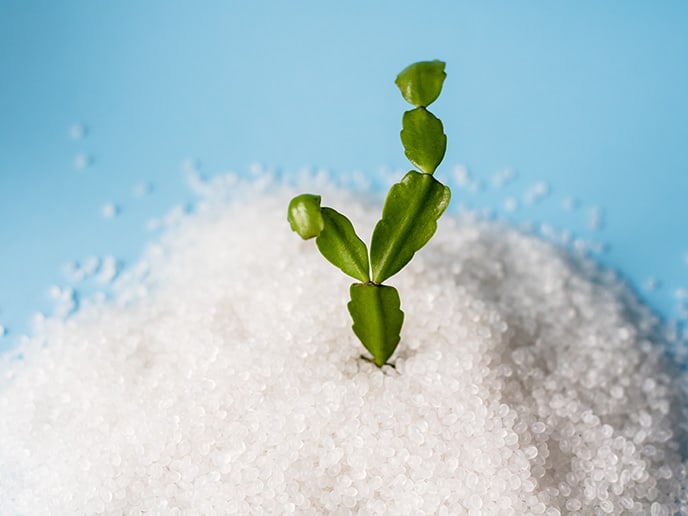A new bio-based polymer could be good news for the environment. A recent assessment of its industrial production and use in bottles points to potentially major reductions in greenhouse gas (GHG) emissions.
Plastics are harming the planet – that is a fact. But like it or not, they are an integral part of modern life, which is why scientists have been focusing on alternatives to plastics made from non-renewable petroleum. One promising polymer is polyethylene furanoate (PEF), a 100 % bio-based alternative to the petroleum-based polyethylene terephthalate (PET) used to manufacture over 500 billion plastic bottles every year. PET is the chemical name for polyester.
Now, a peer-reviewed life-cycle assessment (LCA) of the PEF applications developed by Dutch chemical technology company Avantium has showed that replacing use of fossil carbon in PET with totally renewable carbon in PEF in the production of 250 ml and 500 ml bottles would lead to a significant drop in GHG emissions. The LCA was conducted as part of the EU-funded PEFerence project, of which Avantium is the coordinator.
The Dutch company has developed a technology called YXY® to convert plant-based sugars into a fully recyclable polymer. The resultant 100 % bio-based, recyclable and degradable polymer combines environmental features with superior performance when compared with PET. It boasts better barrier properties for CO2 and oxygen (therefore lengthening the shelf life of packaged products) and higher mechanical strength (leading to thinner PEF packaging requiring fewer resources). It also has a 12 °C higher heat resistance than PET.
“The main building block of PEF, FDCA (2,5-furandicarboxylic acid) can be produced from sugars (fructose), for example from wheat, corn and sugar beet. FDCA is polymerised with plant-based mono-ethylene glycol (MEG) to make a 100 % plant-based PEF polymer. When fully technologically developed, PEF can also be produced from cellulose and thus from agricultural and forestry waste streams. Avantium’s current process utilises starch from European wheat,” states a press release posted on the website of German project partner nova-Institute that conducted the LCA.
LCA insights
The LCA analysed 16 different impact categories covering the environmental impact of PEF packaging solutions in all relevant life-cycle stages from “cradle to grave.” The results indicated that PEF bottles would reduce GHG emissions by 33 % compared to PET bottles. “PEF would also lead to 45 % lower finite resource consumption of fossil fuels and reduce the pressure on abiotic resources (minerals and metals) by 47 % due to the mechanical properties of PEF enabling light-weighting. However, PET bottles would outperform PEF-bottles in other impact categories mostly arising from the current feedstock supply.”
PEF also has applications in multilayer packaging, when monolayer packaging is not enough to guarantee the required shelf life. The press release reports: “In this LCA, 250 ml PET/PEF multilayer bottles with 10 % of PEF were also assessed and compared to reference PET/PA bottles with a typical 7 % of PA (polyamide). The analysis showed that significant reductions of around 37 % in GHG emissions could be achieved by replacing the PA layer with PEF, mainly attributed to the recyclability of the PET/PEF system over the non-recyclability of the PA-containing system. This replacement would also contribute to a significant reduction of finite resources demand (-37 % and -52 % of fossil fuels and minerals and metals, respectively).”
The aim of PEFerence (From bio-based feedstocks via di-acids to multiple advanced bio-based materials with a preference for polyethylene furanoate) is to establish the world’s first industrial-scale, cost-effective FDCA plant. Project lead Avantium intends to open this plant in 2024.
Packaging 360 is a comprehensive knowledge sharing ecosystem for the Indian packaging industry. Our services include an online content platform to deliver news, insights and case studies; organising conferences seminars and customised training; Providing Bespoke Project Consulting, Market Research and Intelligence.







